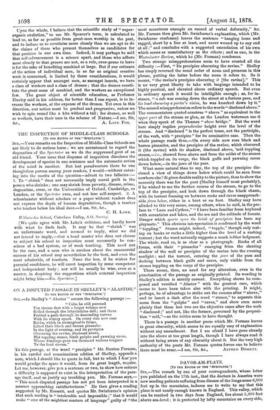THE INSPECTION OF MIDDLE-CLASS SCHOOLS.
[TO THE EDITOR OF THE "SPECTATOR."]
SIR,—Your remarks on the Inspection of Middle-Class Schools are not likely to do serious harm ; we are accustomed to regard the dogmatism of the Spectator as we do the suppressed gout of an old friend. Your issue that disposes of inspection dismisses the development of species in one sentence and the automatic action of the mind in another. But lest peradventure there be one thoughtless person among your readers, I would—without enter- ing into the merits of the question—advert to two fallacies :— 1. To " shrink " does not necessarily imply moral guilt in the person who shrinks ; one may shrink from poverty, disease, crime, dogmatism, error, or the Universities of Oxford, Cambridge, or London, or the Spectator even, and not lose self-respect. 2. A schoolmaster without scholars or a paper without readers does not express the depth of human degradation, though a teacher who teaches below his ideal does.—I am, Sir, &c., [We quite agree with Mr. Lake's criticism, and hardly know with what he finds fault. It may be that " shrink " was an unfortunate word, and seemed to imply, what we did not intend to imply,—that a head master who does not choose to subject his school to inspection must necessarily be con- scious of a bad system, or of weak teaching. This need not be the case, and a man who is careless about the commercial success of his school may nevertheless be the best, and even the most admirable, of teachers. None the less, if he wishes for parental confidence, he will court inspection by some competent and independent body ; nor will he usually be wise, even as a master, in despising the suggestions which external inspection might bring him.—En. Spectator.]






























 Previous page
Previous page